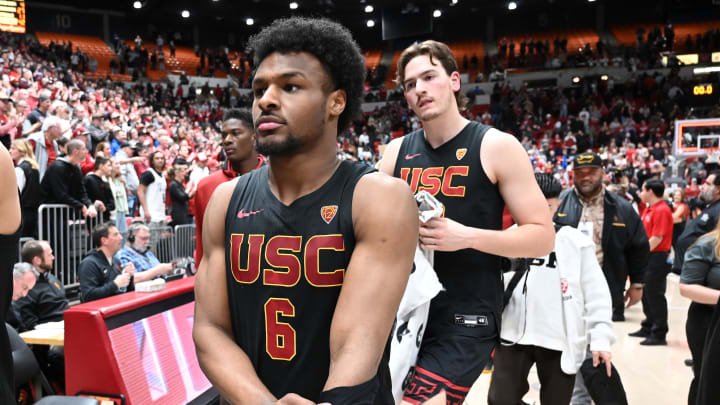Bronny James Media Coverage Was Overwhelming, But Never Had an Impact

There was much backlash from the general public regarding sports media's overwhelming coverage of Bronny James, the son of LeBron who was part of the 2024 NBA draft class. Some of it was just LeBron fatigue. The man has been at the center of the basketball universe for over two decades and it is understandable if a good chunk of the viewing audience is tired of hearing about anything related to him. Some of it was just straight-up hating, for lack of a better term. Some members of the audience didn't want to hear about Bronny because he was LeBron's kid.
Much of the good faith criticism (if there is such thing when it comes to LeBron James) was mostly centered around one argument, though— if he wasn't LeBron's kid, nobody would be talking about him.
Which is ... true. Bronny's draft profile is not one that usually dominates news cycles. He played 25 games at USC, averaged 4.8 points in 19.3 minutes per game, and has no overwhelmingly dominant skill. USC went 15-18 and scored 49 points in a season-ending loss to Arizona in the Pac-12 tournament. There wasn't even a viral highlight to come out of his college career. The only above-average traits relative to his peers entering the draft were his defense and athleticism. All that shapes up to an uninteresting draft prospect who might end up a second-round pick because the second round of the NBA draft is a crapshoot of epic proportions.
But he is LeBron's kid. Therefore, many A-block segments were dedicated to discussing his pro prospects. This led to a larger talking point amongst the audience that Bronny is being portrayed as better than he actually is, that all the talking heads' focus on what he does well will inflate his draft stock beyond what his resume merits.
It was easy to dismiss that out of hand because, obviously, the idea that NBA decisions are based in any way off media coverage is ridiculous. But as the draft drew closer and the Bronny hype got louder, the idea gained momentum. Rumors were out there suggesting the Los Angeles Lakers might use the No. 17 pick in the first round on Bronny instead of their later spot. The Phoenix Suns were tabbed as another interested party with the No. 22 pick. Such rumors were very much at odds with the months of coverage that led everybody watching to conclude Bronny has a long way to go before he is a viable NBA player.
Then the draft started. Bronny did not go in the first round. Nor did he go particularly early in the second. He was picked by the Lakers with the 55th overall selection, the third-to-last pick in the entire draft.
Would he have gotten picked there if he wasn't LeBron's son? No. Which is the whole point. Bronny was going to get picked by the Lakers in some capacity because his dad wants to play on the same team as him and was willing to go to great lengths to make that happen. The media coverage was driven by that inevitability.
And it ultimately meant nothing. It was a way to fill the many required hours. Nothing more. It can now be said, definitively, that there was no correlation between the amount of media attention Bronny received and his draft status.
In the big picture, this situation serves as a nifty reminder that what gets talked about (and how it gets talked about) on television is dictated by what the teams are thinking, not the other way around. Talking points are informed by impressions analysts receive from the higher-ups. There is no inverse version of this relationship, where an NBA GM is watching First Take so often that he internalizes the opinions of talking heads and changes his team accordingly.
Bronny James was good for business and that's why he was talked about so often. It was never anything bigger than that.
